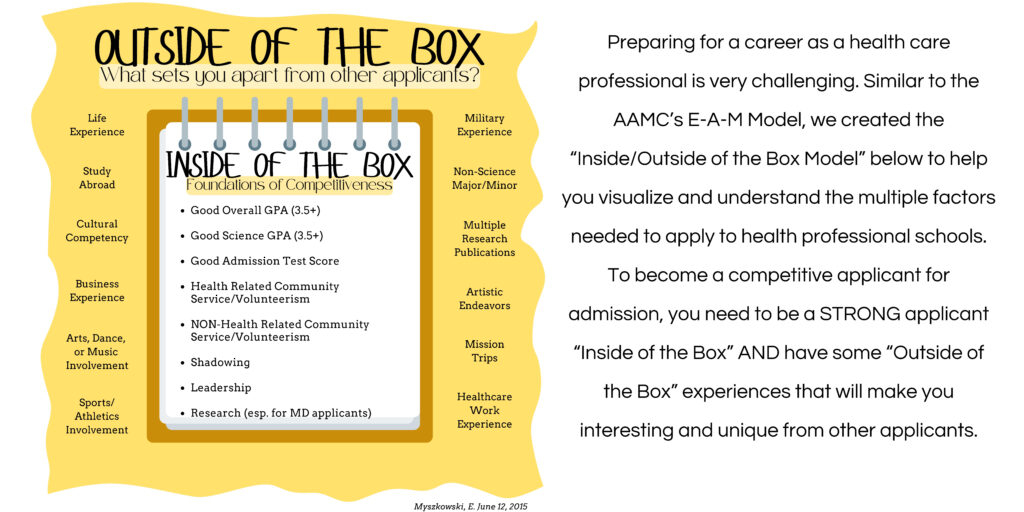
Inside of the Box Experiences
Academic Preparation
Did you know that health professional schools have a list of coursework that must be completed prior to being accepted into their program? Pre-Health students can BE ANY MAJOR as long as they complete the prerequisite courses required by the schools.
Email us at aap@ucf.edu to be added to one of our Health Professional Webcourses! Please include your UCF ID.
Dental School
Medical School
Optometry School
Occupational Therapy Programs
PA Programs
Pharmacy School
Podiatry School
Physical Therapy Programs
Veterinary School
- Overall GPA should be 3.5 or above to be a competitive applicant for health professional schools.
- Science GPA should also be around 3.5 or above to be a competitive applicant for health professional schools. The types of courses that will be calculated into a Science GPA will vary by health professional school application system, but will typically include: Biological Sciences (ex. General Biology, Anatomy, Microbiology, etc.), Chemistry courses, and Physics courses, and sometimes Mathematics and Statistics courses.
Treat your admission test as the most important test you will take in your life so far. Your score on your admission test can greatly affect your competitiveness for admission. Students who earn high scores on admission tests like the MCAT often study for 2-3 months, 5-6 days per week, 4-8 hours per day for their test. Different tests, different student learning styles, and different student life circumstances will necessitate different amounts of preparation time and different types of preparation though. PHPL can discuss test preparation options with you and help you determine the best test prep option for you.
Extracurricular Preparation
- Involvement in a service activity in a medical/clinical setting without compensation.
- Pre-Med Students are recommended to have approximately 200 hours
- Other Pre-Health Profession Students are recommended to have approximately 75 hours
*Check the PHPL Webcourse for an average number of hours for your chosen profession*
- Involvement in a service activity NOT in a medical/clinical setting without compensation.
- Pre-Med Students are recommended to have approximately 200 hours
- Other Pre-Health Profession Students are recommended to have approximately 100 hours
*Check the PHPL Webcourse for an average number of hours for your chosen profession*
- Shadowing experiences involve observing a health professional while they work. These experiences are typically unpaid. Health professional schools ideally want to see shadowing/observation multiple health professionals in many different specialties (breadth) and for extended periods of time (depth).
- All Pre-Health Profession Students are recommended to have approximately 100 hours
*Check the PHPL Webcourse for an average number of hours for your chosen profession*
- All Pre-Health Profession Students are recommended to have approximately 100 hours
- A position of responsibility for others with a purpose to guide or direct the actions of others. Leadership can be demonstrated in a variety of settings, including at school, employment, church, community, and in organizations. Leadership is very broad, and it can occur in many areas. The areas include, but are not limited to, being a student organization officer or director, RA, TA, tutor, mentor, trainer, or coach.
- Pre-Med Students are recommended to have at least 2 leadership positions for at least 1 year combined
- Pre-Dental, Pre-PA, and Pre-PT Students are recommended to have least 1 leadership position for at least 1 year
- Other Pre-Health Profession Students are recommended to have least 1 leadership position for at least 1 semester
*Check the PHPL Webcourse for an approximate recommendation for your chosen profession*
- Involvement in a scholarly or scientific hypothesis investigation that is supervised by an individual with verifiable research credentials such as a professor or physician. Research experience may be gained in any discipline and performed at any site. Health professional schools are not particular about what type of research a student does, they just want the student to have a familiarity with and background in research.
- Pre-Med Students are recommended to assist a professor or physician with their research and try to obtain a presentation and/or a publication in a journal. An independent research project is even more beneficial.
- Other Pre-Health Profession Students are recommended to engage in a research project or experience from a class. Assisting a professor with their research outside of class or an independent research project is even more beneficial.
Outside of the Box Experiences
- Join a UCF Pre-Health Student Organization.
- “Distance-Traveled”- defined as the road traveled to become a health professional school applicant. For example, the “distance traveled” by a socioeconomically disadvantaged applicant is often farther than other applicants.
- Sports/Athletics Involvement (even intramural sports)
- Arts/Dance/Music Involvement
- Study Abroad
- Business Experience
- Mission Trips (international or abroad, medical or non-medical)
- Cultural Competency Experiences
- Hobbies
- Artistic Endeavors
- Non-Science Major/Minor
- Multiple Research Publications
- Healthcare Work Experience (if Pre-PA, then this is highly recommended)
- Military Experience
- Life Experiences
- And many others!